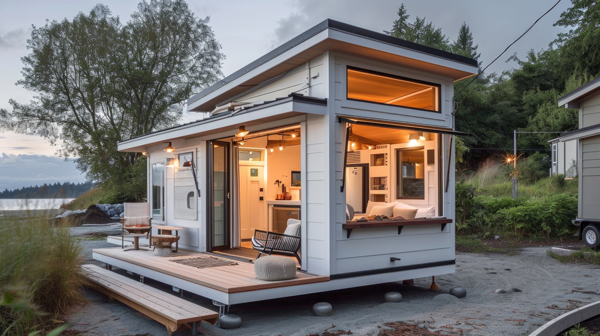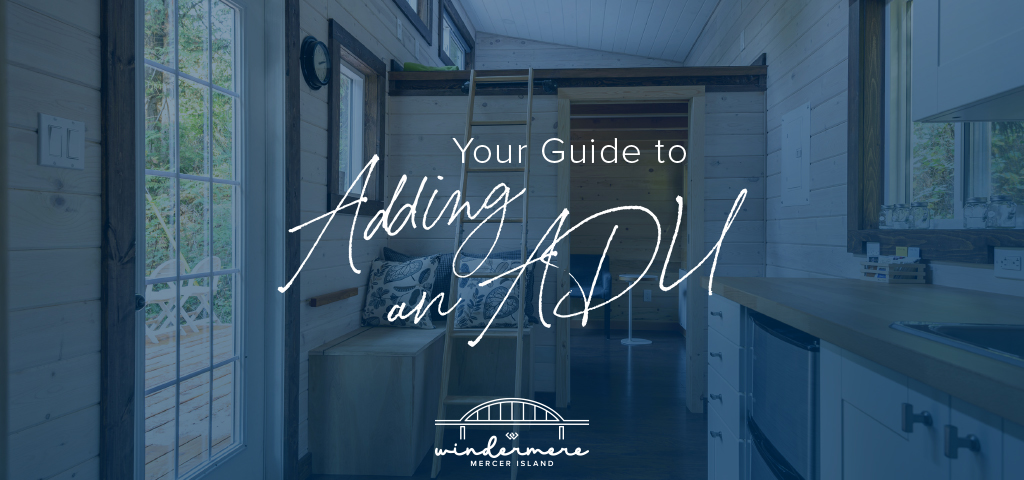ADUs and DADUs are increasingly popular among homeowners looking to maximize their property value. For many cities in Washington State, the recent enactment of House Bill 1337 has made it easier for homeowners to add an ADU/DADU by loosening restrictions on them in residential areas. Other states have enacted similar laws as municipalities across the country try to address our shortage of “middle” affordable housing.
As the movement of short-term rentals, turnkey properties, and real estate investment continues to grow, it’s worth it to take a moment and understand the regulations that dictate a property’s potential—especially before you buy. Understanding a bit about the permitting process will also help you avoid getting bogged down in legalities when trying to build structures on your property.
What is an ADU, and do I need a permit to build one?
 Accessory Dwelling Units (ADUs) and Detached Accessory Dwelling Units (DADUs) are essentially guest quarters that offer independent living space for renting out or accommodating multi-generational family members. Typically, they include a separate entrance, kitchen, living area, bedroom, and bathroom. Common examples are a basement apartment, converted garage, backyard cottage, or prefab modern shed. They’re a great way to get the highest return on your property investment. Before you break ground on your building project, however, here are some of the things you should keep in mind.
Accessory Dwelling Units (ADUs) and Detached Accessory Dwelling Units (DADUs) are essentially guest quarters that offer independent living space for renting out or accommodating multi-generational family members. Typically, they include a separate entrance, kitchen, living area, bedroom, and bathroom. Common examples are a basement apartment, converted garage, backyard cottage, or prefab modern shed. They’re a great way to get the highest return on your property investment. Before you break ground on your building project, however, here are some of the things you should keep in mind.
- Permits and Regulations: No matter where you live, it is necessary to obtain an appropriate permit before you begin the construction/conversion process. Permits ensure that your project complies with local building codes and regulations (and also allow you to count that square footage as living space when you sell the property or have it appraised). Here are ADU regulations for King County, or check with your local city/county.
- Code Compliance: Building codes aren’t just red tape for the sake of red tape; they exist to make sure that all buildings are safe. Whether you’re building the structures on your property yourself or hiring a professional to do the job, familiarize yourself with your local codes and regulations. In the city of Seattle, HB 1337 allows homeowners to build at least two 1,000 sq. ft. ADUs per lot (whether attached or detached). Contact your local zoning department or building authority to learn more.
- Applying for a Permit: The permit application process varies by location. Typically, you’re required to submit detailed plans for your project with documents that outline its scope, size, etc. Whether you submit architectural drawings, engineering plans, or some other form of detailed blueprint, be prepared for a thorough review on behalf of your local authority to make sure your project complies with the rules.
Whatever project you have in mind—whether converting existing structures or building new ones—it’s important to become well-versed in the permits and regulations that will allow you to get it approved hassle-free. Consult with local authorities to get the full picture of what’s required from you. Once you’ve checked all the boxes, you’ll be well on your way to maximizing the value of your property.
Curious what your return on investment might be when it’s time to sell? Contact me for a Comparative Market Analysis. I can also put you in touch with a property management company to estimate market rental rates in your area.
Adapted from an article that originally appeared on the Windermere blog September 6, 2023.

We earn the trust and loyalty of our brokers and clients by doing real estate exceptionally well. The leader in our market, we deliver client-focused service in an authentic, collaborative, and transparent manner and with the unmatched knowledge and expertise that comes from decades of experience.
© Copyright 2025, Windermere Real Estate/Mercer Island.

 Facebook
Facebook
 X
X
 Pinterest
Pinterest
 Copy Link
Copy Link



